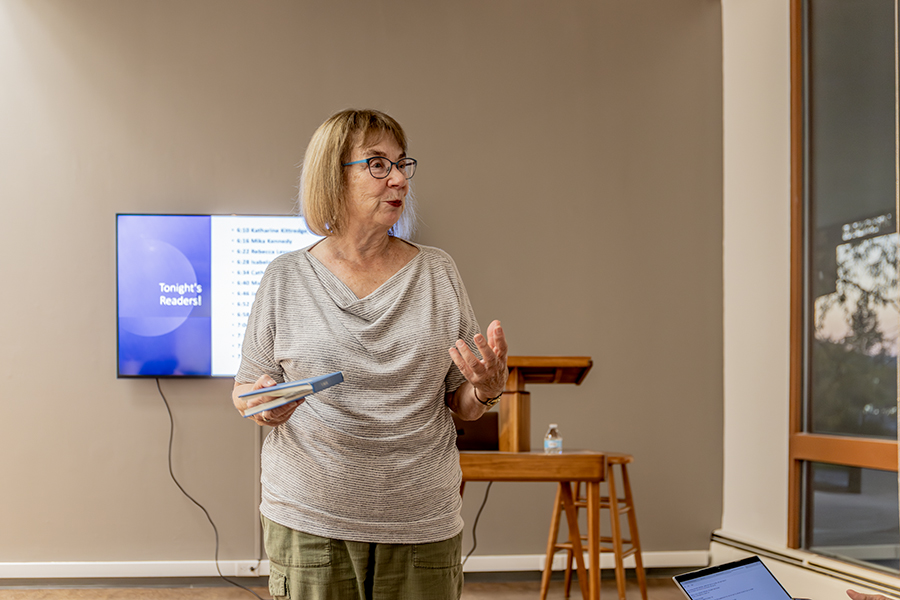With rising rates of book banning and censorship, libraries throughout the United States, including in the Ithaca community, have planned events to recognize Banned Books Week from Oct. 1–7.
Since Banned Books Week was founded in 1982, people from across the U.S. have read banned books for one week in the fall.
Ithaca College held a Banned Books Read Out event from 6–7:30 p.m. Oct. 3 in the Gannett Center’s Handwerker Gallery. Students, faculty, staff and community members gathered in solidarity with those impacted by book bans and opposed unjust censorship by reading challenged works. About 20 people attended the event.
The majority of those in attendance at the event signed up to read excerpts from books, song lyrics and poems, including “To Kill a Mockingbird” by Harper Lee and “The Sun Also Rises” by Ernest Hemingway.
Communications Librarian Cathy Michael has been involved in and organizing the Banned Book Read Out for 10 years. She said one of her goals for the event was to bring light to the importance of reading banned or censored literature. Michael began the event by sharing present-day statistics that showed the audience how the issue is even more apparent now than ever.
Michael said people who challenge the books often take their frustrations out on the librarians for having the content to begin with.
“A lot of times, librarians get called pedophiles for having books about human sexuality,” Michael said. “It’s very distressing.”
One of the sponsors for Banned Books Week is the American Library Association. The ALA’s Office for Intellectual Freedom reported that there were 3,923 books targeted for censorship between Jan. 1 and Aug. 31 of 2023. This is the highest number the ALA has seen since the data collection began over 20 years ago. According to the ALA, books that have been banned or highly challenged are primarily written by or about people of color or members of the LGBTQ+ community.
Michael said that having diverse content available in libraries is important to forming an inclusive community. Reading banned books instills empathy and compassion in the readers.
“When we read a book of fiction, we empathize with points of view that are not our own,” Michael said. “[Books] may also help someone who feels lost feel connected or help youth find out who they are. … We need to make sure the material is there for the people who need it.”
The Ithaca College Library has a Banned and Censored Media page where students can find lists of banned books.
Katharine Kittredge, professor in the Department of Literature in English, said libraries are meant to be safe places in communities, but school librarians are struggling because they have had to deal with an influx of parents challenging books.
Kittredge said the fear of backlash from parents can be a ban within itself, as teachers and librarians find themselves not choosing diverse literature to share with students because they are concerned about the reactions from parents. The self-censoring that teachers and librarians are doing is preventing students from learning the content they need to know.
Kittredge said she is concerned that the alternative to books is the internet. The internet is less private because adults can monitor browsing histories. It can also lead to content that is much more graphic. However, librarians do not disclose who takes out which books.
“It’s a way that kids can explore their identity or the identities of people around them in a private, protected way,” Kittredge said. “If we take that away from them, they are stuck turning to the internet and that’s a scary prospect.”
Amnesty International, the world’s largest grassroots human rights organization, also sponsors Banned Books Week and stands up for the individual writers, musicians, readers and librarians who have been punished for their words. Group #73 is the Ithaca chapter of Amnesty International. Members meet every third Tuesday of the month to write letters on urgent action cases and plan events that promote awareness.
Ute Ritz-Deutch, the local group coordinator and area coordinator for the Ithaca Amnesty chapter, worked with fellow members of Ithaca’s Amnesty chapter and the Ithaca College Library to help set up the Banned Book Read Out event. She said she believes speaking out against censorship is a key part of stopping it.
“When people get active, change can happen,” Ritz-Deutch said. “You have to be in it for the long haul because success is not instantaneous. … Civic engagement can bring about major changes.”
Michael said those who value diverse learning environments should stand together and fight back when books are banned in their community.
“With books being withdrawn from schools and public libraries, all American citizens should be aware and engaged with this issue and speak out to support libraries and librarians and the information made available,” Michael said. “What prevents this is awareness and action, especially at the local level.”








